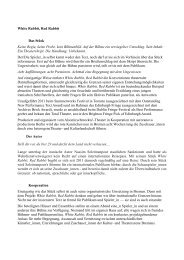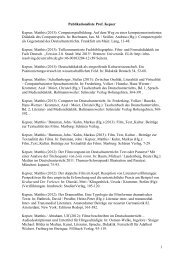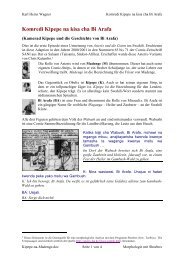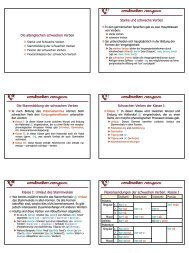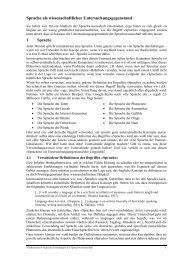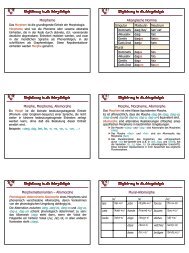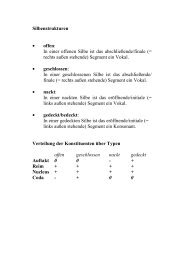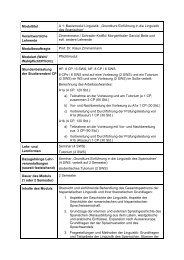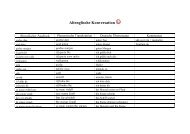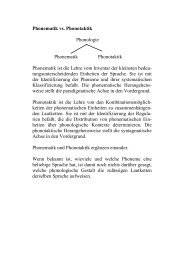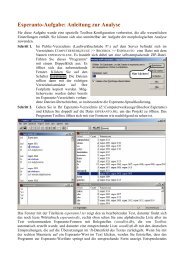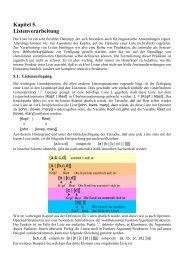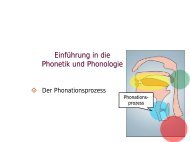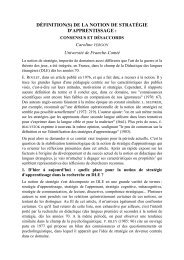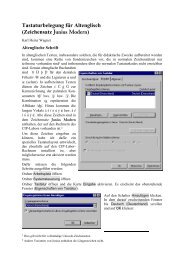Relativism and Universalism in Linguistics - Fachbereich 10 ...
Relativism and Universalism in Linguistics - Fachbereich 10 ...
Relativism and Universalism in Linguistics - Fachbereich 10 ...
Create successful ePaper yourself
Turn your PDF publications into a flip-book with our unique Google optimized e-Paper software.
140 Workshops<br />
(3) mog uspet’, ‘could manage’, mog ugovorit’ ‘could persuade’ etc.<br />
1.2. Verbs of state are also admissible <strong>in</strong> the context of epistemic moch’. In this context the<br />
aspect of the verb is <strong>in</strong>evitably imperfective:<br />
(4) On mog naxodit’sya v bedstvennom polozhenii ‘he could be <strong>in</strong> a disastrous situation’; on<br />
mog ot etogo stradat’ ‘he could suffer because of that’.<br />
Now, <strong>in</strong> the context of epistemic moch’ negation changes the modal mean<strong>in</strong>g of the modal<br />
verb: <strong>in</strong> (1) the speaker was <strong>in</strong> the state of lack of knowledge – (s)he accepted both<br />
possibilities; while (1′) excludes one of the possibilities <strong>and</strong> (s)he is, thus, <strong>in</strong> the state of<br />
knowledge. But the modality rema<strong>in</strong>s epistemic: this knowledge is arrived at by <strong>in</strong>ference:<br />
(1′) On ne mozhet oshibit’sja, obmanut’, opozdat’, najabednichat’, donesti, sovrat’,<br />
uklonit’sja, promaxnut’sja, etc.<br />
Thus, <strong>in</strong> case of moch’, negation has no direct <strong>in</strong>fluence upon the aspect of the verb <strong>in</strong> the<br />
<strong>in</strong>f<strong>in</strong>itive.<br />
2. Now with nado the situation is entirely different: nado, <strong>in</strong> its primary mean<strong>in</strong>g, occurs<br />
exclusively with verbs denot<strong>in</strong>g actions (<strong>and</strong> activities) <strong>and</strong> negation drastically <strong>in</strong>fluences the<br />
choice of aspect <strong>in</strong> its dependent <strong>in</strong>f<strong>in</strong>itive.<br />
Namely, <strong>in</strong> non-negated contexts both aspects are possible (cf. Rassudova 1968):<br />
(5) a. nado varit’kartoshku[Ipf] ‘it is necessary to boil[Ipf] potatoes’;<br />
b. nado svarit’[Pf] kartoshku ‘it is necessary to boil[Pf] potatoes’<br />
(6) a. nado ch<strong>in</strong>it’[Ipf] kryshu ‘it is necessary to repair[Ipf] the roof’;<br />
b. nado poch<strong>in</strong>it’[Pf] kryshu ‘it is necessary to repair[Ipf] the roof’.<br />
The difference <strong>in</strong> mean<strong>in</strong>g between a <strong>and</strong> b examples <strong>in</strong> (5), (6) is thoroughly described <strong>in</strong><br />
Paducheva 1996: 53-65; <strong>in</strong> fact, <strong>in</strong> (5a), for <strong>in</strong>stance, the activity is <strong>in</strong> the center of attention,<br />
while <strong>in</strong> (5b) the focus is transferred to the result<strong>in</strong>g state.<br />
In the context of negated nado the only possibility is imperfective:<br />
(5′) a. ne nado varit’[Ipf] kartoshku ‘it is not necessary to boil[Ipf] potatoes’;<br />
b. *ne nado svarit’[Pf] kartoshku ‘it is not necessary to boil[Pf] potatoes’<br />
This co-occurrence restriction can be regarded as semantically motivated. In fact, <strong>in</strong> order to<br />
say that the action as a whole makes no sense it is sufficient to say that this is true about the<br />
very beg<strong>in</strong>n<strong>in</strong>g of the activity.<br />
Thus, we arrive at the conclusion that aspect is <strong>in</strong>dependent of negation + modality<br />
comb<strong>in</strong>ation <strong>in</strong> the case of epistemic modality, while negation+deontic modality places a<br />
severe restra<strong>in</strong>t on aspectual choice. It would be <strong>in</strong>terest<strong>in</strong>g to f<strong>in</strong>d out whether there are<br />
typological parallels to this effect <strong>in</strong> other languages.<br />
References<br />
Auwera, Plungian 1998 – Auwera J. van der, Plungian V.A. Modality’s semantic map. In:<br />
Fr.Plank (ed.) L<strong>in</strong>guistic typology. Berl<strong>in</strong>: Mouton de Gruyter, 1998.<br />
Paducheva 1996 – Paducheva E.V. Semanticheskie issledovanija. Semantika vremeni I vida.<br />
Semantika narrativa. Moscow: Jazyki russkoj kul’tury, 1996.<br />
Rassudova 1968 – Rassudova O.P. Upotreblenie vidov glagola v russkom jazyke. M.: MGU,<br />
1968.



